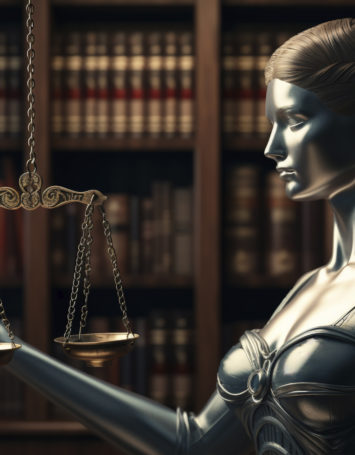With the burgeoning use of artificial intelligence (“AI”) systems has come the growing concern over the role of AI systems or devices vis a vis intellectual property rights (“IPR”). In April 2023, the U.S. Supreme Court declined to hear a challenge by computer scientist Stephen Thaler, appealing the refusal of the U.S. Patent and Trademark Office to issue patents for inventions created by his AI system. Thaler had appealed a lower court ruling that patents can be issue only to human inventors and that his AI system thus could not be considered the legal creator of the inventions he claimed that it generated.
More recently, a federal district court in the District of Columbia rejected an attempt by Thaler to register a copyright for an artwork generated by his AI system. However, the court in that case noted that:
Undoubtedly, we are approaching new frontiers in copyright as artists put AI in their toolbox to be used in the generation of new visual and other artistic works. The increased attenuation of human creativity from the actual generation of the final work will prompt challenging questions regarding how much human input is necessary to qualify the user of an AI system as an “author” of a generated work, the scope of the protection obtained over the resultant image, how to assess the originality of AI-generated works where the systems may have been trained on unknown pre-existing works, how copyright might best be used to incentivize creative works involving AI, and more.
Thaler v. Perlmutter, Case 1:22-cv-01564-BAH, D.I. 24, Memorandum Opinion at 13 (D.D.C., Aug. 18, 2023).
In that case, Thaler sought to register for copyright an AI-generated piece of visual art, listing the AI system as author and explaining that the copyright should transfer to him as the owner of the machine. The work, entitled “A Recent Entrance to Paradise,” is reproduced below:
Thaler claimed the copyright of the “computer-generated work” himself “as a work-for-hire to the owner of the Creativity Machine.”
The Copyright Office denied the application on the grounds that the work lacked human authorship, a prerequisite for a valid copyright to issue. Thaler eventually sued the Copyright Office and Shira Perlmutter, in her capacity as the Register of Copyrights and the Director of the U.S. Copyright Office, in the U.S. District Court for the District of Columbia. Thaler claimed that the Copyright Office’s denial of registration for his AI-generated work was “arbitrary, capricious, an abuse of discretion and not in accordance with the law, unsupported by substantial evidence, and in excess of Defendants’ statutory authority,” in violation of the Administrative Procedure Act (“APA”). Thaler and the Copyright Office cross-moved for summary judgment on the sole legal issue of whether a work autonomously generated by an AI system is copyrightable. The court held that the Copyright Office was correct that human authorship is an essential part of a valid copyright claim, and denied Thaler’s motion and granted the Copyright Office’s cross-motion. The court said, unambiguously, “United States copyright law protects only works of human creation.”
The court agreed with Thaler that U.S. copyright law has been designed to adapt with the times, but said that, underlying that adaptability “has been a consistent understanding that human creativity is the sine qua non at the core of copyrightability, even as that human creativity is channeled through new tools or into new media.” Per the court, “Copyright has never stretched so far, however, as to protect works generated by new forms of technology operating absent any guiding human hand,” continuing, “Human authorship is a bedrock requirement of copyright.”
The court noted that, although “author” is not defined in the Copyright Act, the current version of the Act requires a copyrightable work to have an originator with the capacity for intellectual, creative, or artistic labor. Per the court, this means that that originator must be a human being to claim copyright protection. (In a footnote, the court referred to the issue of whether non-human sentient beings may be covered by “person” in the Copyright Act as only “fun conjecture for academics,” citing a recent law review article.)
The court found that the current Act’s “authorship” requirement as presumptively being human “rests on centuries of settled understanding” and that the understanding that “authorship” is synonymous with human creation has persisted even as the copyright law has otherwise evolved. Per the court, “There is absolutely no indication that Congress intended to effect any change to this longstanding requirement with the modern incarnation of the copyright law.”
The court also found that other courts have uniformly declined to recognize copyright in works created absent any human involvement, “even when, for example, the claimed author was divine.” (Citing cases). The court said that Thaler “can point to no case in which a court has recognized copyright in a work originating with a non-human.”
Finally, although the court recognized that “we are approaching new frontiers in copyright as artists put AI in their toolbox to be used in the generation of new visual and other artistic works” and that “[t]he increased attenuation of human creativity from the actual generation of the final work will prompt challenging questions regarding how much human input is necessary to qualify the user of an AI system as an ‘author’ of a generated work,” the court ultimately found that the case at hand “is not nearly so complex.” The court noted that Thaler informed the Register of Copyrights that the work at issue was “[c]reated autonomously by machine,” and that his claim to the copyright was only based on the fact of his “[o]wnership of the machine.” The Register therefore made her decision based on the fact the application presented that Thaler played no role in using the AI to generate the work, which he never attempted to correct. Per the court, the only question is whether a work generated autonomously by a computer system is eligible for copyright. The court concluded, “In the absence of any human involvement in the creation of the work, the clear and straightforward answer is the one given by the Register: No.”
Note that, although the court ruled that, per the current version of the Copyright Act, human authorship is mandatory, the court also noted that “[t]he increased attenuation of human creativity from the actual generation of the final work will prompt challenging questions regarding how much human input is necessary to qualify the user of an AI system as an ‘author’ of a generated work.” To that end, we note that the Copyright Office recently established an initiative to examine copyright law and policy issues related to AI, as well as releasing guidance for submitting creations that included AI-generated work, including a requirement that applicants specify human authorship and explain which portions were produced by an algorithm.
Also, among the AI-related cases still pending, an artist whose AI-generated work won an art contest last year at the Colorado State Fair has filed an appeal of the Copyright Office’s refusal to register copyright for himself as sole author of images produced by an AI-generative algorithm. The artist is threatening to pursue litigation if his appeal is denied.




